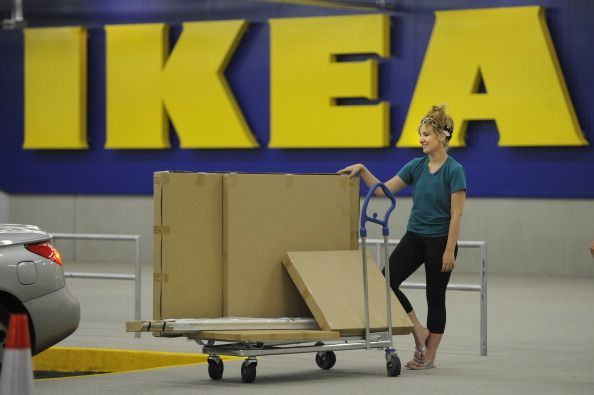Ikea Latest Retailer To Lift Pay For U.S. Workers; Will Offer Hourly Starting Wages Of Almost $12

Ikea is hiking wages for the second straight year, raising average minimum pay at its 40 U.S. stores to nearly $12 an hour. The Swedish purveyor of home accessories and ready-to-assemble furniture announced the wage boost on Wednesday, saying it would apply to 32 percent of the company’s 10,500 American store workers, according to the Associated Press.
The move comes on the heels of other pay increases in retail: Walmart, Target and TJX, which owns T.J. Maxx and Marshall’s, all enacted wage increases earlier this year, bringing starting pay at their stores to least $9 an hour.
But Ikea does things a bit differently. In January, the company set new, higher pay rates at each of its stores using data from the Massachusetts Institute of Technology’s Living Wage Calculator. The database estimates the minimum hourly pay an individual must earn in order to meet basic expenses like housing, food and transportation in a given community.
The latest wave of pay hikes, which the company announced will take effect next January, reflect new data in the calculator. Under this system, employees at Ikea’s store in Brooklyn -- where the living wage is $14.30, according to the calculator -- will continue to make more than those in Charlotte -- where the living wage is $11.00. Overall, the company estimates an average minimum hourly pay of $11.87.
Moira Bulloch, a spokesperson for the United Food & Commercial Workers, which is trying to unionize Ikea stores, said Wednesday's announcement is a sign the company is "listening to worker concerns." But she also criticized the company for not doing enough to ensure its jobs are full-time, rather than part-time.
Elvis Guerrero, 19, works in the recovery department at an Ikea in College Park, Md. -- a suburb of Washington, D.C. -- and says the vast majority of his co-workers there are part-time employees. When he started the job a year and a half ago, he was making $10 an hour, working 40 hours a week. Then the wage hike came, lifting hourly minimum pay to $13.20. "I was like, cool, that's awesome," he says. "I was excited." But shortly thereafter, management slashed hours across the board. Now, he just works 24 to 28 hours a week. Guerrero is a student and doesn't want to put in more time than he already does, but "there's people who want more hours and they can't get more hours," he says.
At an rate, Rob Olson, the chief financial officer for Ikea’s U.S. division, told Huffington Post the pay hikes have reaped rewards for the company so far, reducing employee turnover by 5 percent and thereby saving costs that come with recruiting and training new workers. He also said higher pay has attracted more qualified applicants.
The retail sector employs more than 2 million salespeople in the United States, according to the Bureau of Labor Statistics, but offers workers an average pay of just above $12 an hour. Upward wage pressure in the sector reflects modest improvements in the labor market: As the unemployment rate declines, companies are compelled to offer more attractive compensation or risk employees and potential applicants looking elsewhere for work.
But the pay pressure also flows from changes in the political climate: Amid labor-backed protest movements like the Fight for $15, more than a dozen states and cities, including Los Angeles, have enacted higher wage floors over the last few years. Twenty-nine states and the District of Columbia mandate an hourly minimum pay above the federal rate of $7.25.
© Copyright IBTimes 2024. All rights reserved.





















